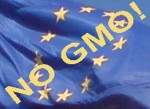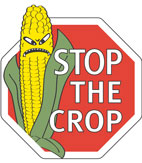Why attend?
Food and Democracy takes place in a critical phase of the debate about agro-GMOs in Europe. The battle for authorizations within the EU for the autonomy of member states and the creation of GMO-free zones is in full swing. Important decisions will be taken in the coming months. GMO opponents are organizing activities to accompany this process.
At the GMO-free regions’ 5th European conference, “Food and Democracy”, on April, 24th and 25th 2009, in Lucerne (Switzerland) you can find out about all these developments first hand, exchange views, create networks and – last but not least – meet like-minded people, again or for the first time.
The EU is moving

The EU is currently taking pioneering decisions regarding the cultivation of genetically modified (GM) plants:
Europe is to a large extent GMO-free. The cultivation of GMOs in Europe currently amounts to only 0.01% of cultivation worldwide and is limited to Germany, Spain, Portugal, the Czech Republic and Slovakia. Since 1998, no new GMOs have been authorized for cultivation.
For the first time, the EU Commission now wants to authorize the cultivation of new GMO varieties. However, in February 2009, no agreement could be found among EU member states on new authorizations for the two GM Bt corn lines Bt11 and 1507. The vote in the “Standing Committee” ended without the requisite majority. Now EU ministers will have to decide.
Many EU countries have made use of so-called national safeguard clauses and have banned the cultivation of the only GM corn authorized in the EU (Monsanto’s Mon 810) on their territories. The EU Commission wants to annul these bans.
In March, a 2/3 majority of EU ministers upheld the cultivation bans in Austria and Hungary, despite a proposal to the contrary by the Commission.
Whether the cultivation bans in France and Greece will also be upheld, will be decided in the coming weeks. The French government wants to maintain its cultivation ban in 2009.
The Austrian Minister of Agriculture, Nikolaus Berlakovich is demanding that, in future, member states should be able to decide themselves whether particular GM varieties can be cultivated or not.
The German Federal Government has also tightened its approach to agro-GMOs and now also intends to examine the possibility of a ban on cultivating GM corn. This was announced by the German Minister of Agriculture, Ilse Aigner, with the support of the Minister of the Environment, Sigmar Gabriel. In mid-February, the President of the German Farmers‘ Union, Gerd Sonnleitner, requested that the cultivation of MON810 should be banned.
In Bavaria the opposition to green genetic engineering has become a “popular uprising”. Politicians have announced cultivation bans for genetically modified Bt corn. Field trials are to be banned as well. “We don’t want any commercial use of green genetic engineering in Bavaria”, the Bavarian Minister of the Environment declared in mid-February.
Stop the Crop

The internet action group Stop the Crop wants to prevent the cultivation of GMO plants in Europe.
The moratorium in Switzerland

Switzerland is the only country in Europe with a moratorium on the cultivation of GMOs that is anchored in the Federal Constitution (Article 197 Clause 7). At the time of the conference, Switzerland will be discussing a prolongation of the moratorium. Parliament wants to debate the issue in its summer session. The “Food and Democracy” conference will influence this decision.
The programme
For two days, Food and Democracy will discuss the future of agriculture and food. We are expecting 300 participants from 30 countries to attend.
The conference opening will feature 11 prominent speakers from Switzerland and the EU. They include the highest-ranking Swiss woman, the President of the National Council, Chiara Somoneschi-Cortesi, the Austrian Minister of Agriculture, Nikolaus Berlakovich, the Scottish Minister of the Environment Michael Russell and the chair of the Bündnis 90/The Greens group in the German Bundestag, Renate K¸nast.
In session 1, leading representatives of the GMO-free movement will speak about the reasons for a Europe without agro-genetic engineering and possibilities for making this come true. New alternative perspectives will be discussed.
In session 2, twelve states from Europe will explain why “Food and Democracy” is important from the point of view of their countries.
On Saturday, 11 workshops will discuss democracy, food and freedom from GMOs.
In conclusion, we will formulate our common visions of a GMO-free and democratic Europe of the regions.
